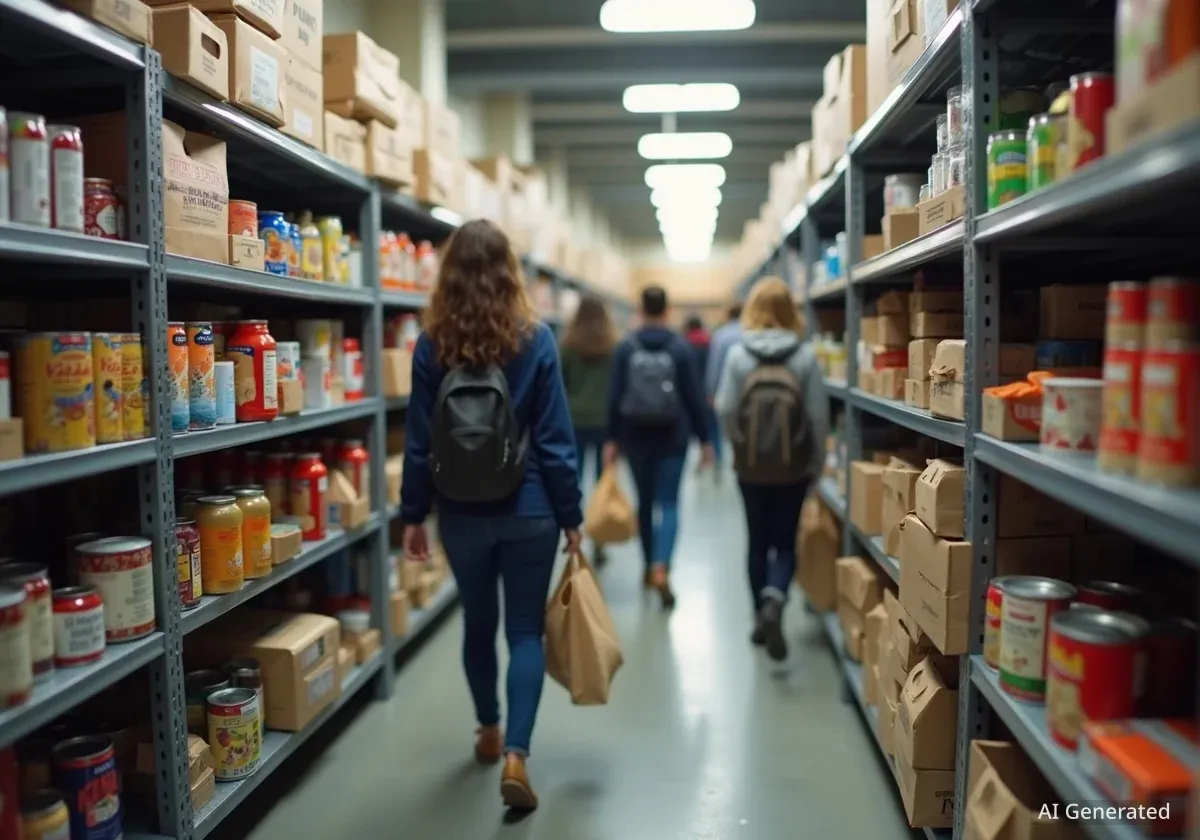A halt in federal food assistance is sending a shockwave through college campuses across the United States. With Supplemental Nutrition Assistance Program (SNAP) benefits suspended for approximately 42 million Americans, over one million college students are now facing heightened food insecurity, forcing universities to expand their emergency support systems.
Campus food pantries, once a supplemental resource, are becoming a primary source of groceries for students who relied on federal aid. University officials report a significant increase in demand as students grapple with the choice between buying food and paying for tuition, housing, and books.
Key Takeaways
- SNAP benefits were suspended for 42 million people, including 1.1 million college students nationwide.
- Universities are increasing the frequency of food pantry pop-ups and meal programs to meet rising student demand.
- Students report significant stress over the loss of benefits, which for some is their primary grocery budget.
- Experts warn that food insecurity can negatively impact students' mental health, academic performance, and enrollment status.
The Immediate Impact on Students
For many students juggling classes and part-time jobs, SNAP benefits are a critical lifeline. The sudden cutoff has left them in a precarious position. At California State University, Sacramento, where over 3,600 students receive SNAP, the campus Basic Needs Resource Center is seeing a constant flow of visitors.
Antonette Duff, a psychology junior at the university, described the center as a "big blessing." Like many others, she depends on the assistance to supplement her grocery budget. July Star Medina, a senior studying biology at Sac State, has seen her monthly benefits decrease from $290 to $120 this year. The prospect of losing that remaining amount is a source of major stress.
"After one week of groceries that’ll last me maybe two weeks... Now I need to see where I can pull money aside to just get basic things," Medina said.
This uncertainty is not isolated. Mike Hannigan, a student at Greenfield Community College in Massachusetts, relies on his nearly $300 monthly benefit. When it failed to arrive in early November, he was left wondering how he would afford groceries. For students without university meal plans, the situation is even more dire, forcing them to consider dropping a class to pick up an extra work shift.
A Growing National Problem
Food insecurity on college campuses is not a new issue, but it has been exacerbated over the past decade. According to the U.S. Government Accountability Office, more than 1.1 million college students nationwide participate in SNAP. In California alone, that number exceeds 200,000 students. These students often prioritize educational expenses over basic needs.
Universities Step Up to Fill the Gap
In response to the crisis, colleges and universities are mobilizing resources to prevent students from going hungry. They are expanding the services of campus food pantries, organizing free meal events, and soliciting donations from the community.
At Sac State, Emily Tupper, the director of Crisis Assistance and Resource Education Support, said the college may hold its free grocery pop-up events more often if the federal aid delays continue. These events provide students with fresh produce and other essentials at no cost.
The University of New Mexico in Albuquerque has also seen a sharp increase in pantry usage. Lisa Lindquist, director of the LoboRESPECT Advocacy Center, noted that between 100 and 150 students visit the campus pantry daily. The demand is so high that staff sometimes have to make emergency grocery runs to keep shelves stocked.
"The food, it just goes in and out so quickly," Lindquist explained. "That tells me anecdotally, there’s great need."
Creative Solutions in Rural Communities
The challenge is particularly acute in rural and tribal areas, which are often classified as food deserts with limited access to affordable, nutritious food. Nueta Hidatsa Sahnish College, a tribal institution in North Dakota with about 250 students, has implemented several programs to support its community.
The college hosts "Soup Tuesdays" for free meals and provides students with meal kits for dishes like chicken Alfredo or chili. Twyla Baker, the college's president, said they will soon distribute grocery store gift cards as well. She criticized the use of vulnerable populations as political leverage.
"To essentially use the most vulnerable as political pawns is just untenable," Baker stated. "It’s unsustainable, and it’s detrimental to the country as a whole."
The Hierarchy of Student Needs
Research shows students often sacrifice food when finances are tight. AJ Scheitler, director of the Data Equity Center at UCLA, explained that students prioritize expenses in a specific order: first tuition and books, then transportation, followed by housing. Food is often the last category, and the one they are most likely to go without if money runs out.
The Broader Consequences for Higher Education
The suspension of SNAP benefits poses more than just an immediate hunger crisis; it threatens the academic future of thousands of students. Experts warn that the stress and instability caused by food insecurity can have a cascading effect on student success.
"Students will first make sure that they pay for tuition and books and all that stuff so that they can stay enrolled at school," said AJ Scheitler of UCLA's Center for Health Policy Research. The constant worry about where their next meal will come from can severely impact mental health and academic focus.
The potential long-term consequences are significant:
- Declining Grades: Hunger and stress make it difficult to concentrate on coursework, leading to lower academic performance.
- Increased Dropout Rates: Some students may be forced to leave school to work full-time simply to afford basic necessities.
- Mental Health Issues: The anxiety associated with food and financial insecurity can lead to depression and other mental health challenges.
Scheitler emphasized the urgency of resolving the situation. "The number of students who may have to drop out of school because they need to eat, their grades are going to fall," she said. "Their mental health is going to be hurt by the stress of not being able to eat. This is going to have a significant impact if they can’t figure out how to fix this and fix this quickly."
As universities work to provide a safety net, the underlying issue remains a political stalemate in Washington. For over a million students, the resolution of this conflict will determine not only their ability to eat but also their ability to continue their education and build a better future.





